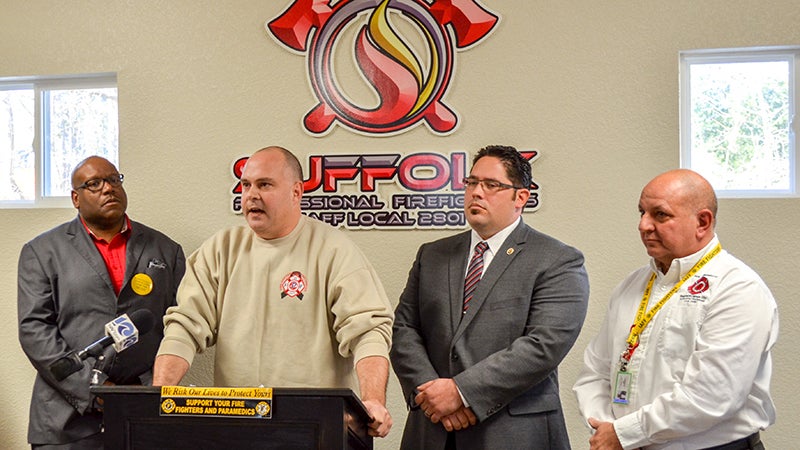Cancer bill ready for vote
Published 10:21 pm Wednesday, January 30, 2019

- Adrian Manning of Newport News Firefighters Association Local 794 talks about his battle with cancer at the Wednesday press conference held at the Suffolk Professional Firefighters Union Hall on Kansas Street. Pictured, from left, are Norfolk Professional Firefighters Norfolk Local 68 President Lawrence Brown, Manning, Portsmouth Professional Firefighters & Paramedics Association Local 539 President Kurt Detrick and Local 2498 President Don Dinse.
Firefighters get cancer more than most. Will proposed bill pass to help them?
The livelihood of Virginia firefighters battling cancer will be decided this week in the General Assembly, and first responders are ready to continue the fight for however long it takes.
Senate Bill 1030, which adds additional types of cancer to the Workers’ Compensation Law, passed the Virginia Senate floor in a 39-1 vote on Friday. Its counterpart, House Bill 1804, will be voted on by the House of Delegates Appropriations Compensation & Retirement Sub-Committee on Thursday.
Current worker’s compensation law covers leukemia, pancreatic, prostate, rectal, throat, ovarian and breast cancer. This would add brain, colon and testicular cancers to the list of cancers under the presumption law, while also closing loopholes that allow the denial of benefits to sick firefighters.
The law also applies to hazardous materials officers for the Department of Emergency Management, State Police commercial vehicle enforcement officers and motor carrier safety troopers and full-time members of the Department of Motor Vehicles enforcement division. But it’s primarily a concern for firefighters due to their relatively higher rate of cancer diagnoses.
At a Wednesday conference at the Suffolk Professional Firefighters Union Hall on Kansas Street, leaders representing thousands of firefighters, paramedics and E-911 dispatchers across Hampton Roads called on their state delegates to help their first responders.
“We’re here today calling on all members of the Hampton Roads delegation to come together, to stand with your firefighters, to fix a broken system and to protect the protectors,” said Kurt Detrick, president of the Portsmouth Professional Firefighters & Paramedics Association, Local 539.
Constant exposure to carcinogens in the line of duty have cost firefighters everything, as cancer has become the most dangerous threat to their health and safety today, Detrick said.
According to data from the International Association of Fire Fighters, 61 percent of career firefighter line-of-duty deaths from Jan. 1, 2002, to March 31, 2017, were caused by cancer. The Centers for Disease Control and the National Institute for Occupational Safety and Health found that firefighters have a 9 percent higher risk of being diagnosed with cancer and a 14 percent higher risk of dying from cancer than the general U.S. population.
Research from the National Institute for Occupational Safety and Health published in 2013 showed that firefighters had a greater number of cancer diagnoses and cancer-related deaths than the general population. They’re twice as likely to develop malignant mesothelioma, for instance, a rare type of cancer caused by exposure to asbestos.
Because asbestos is the only known causal agent for malignant mesothelioma, and firefighters are likely to be exposed to the substance in the line of duty, the National Institute for Occupational Safety and Health concluded that there was a “likely” causal association.
But firefighters don’t debate the risk when they’re called to save lives, not in Suffolk or the rest of the state, said Pamela C. King of Suffolk Professional Firefighters Local 2801.
“They hear the tone and they get on the trucks to answer the call, as you all do across the state of Virginia,” she said. “We do not stand there and debate the pros and cons of answering the call to duty or say, ‘You know, this may be the call I lose my life on. You know, this might be the call that I’ll be exposed to a contaminated material that will give me cancer and take me away from my family.’”
“We answer the call, without any question to protect and serve strangers, and in turn we would like to be taken care of. (It’s) a simple request.”
The bill also corrects a flaw in the law’s terminology that has prevented firefighters from being covered. Firefighters have been denied coverage in the past because they were unable identify which toxin they encountered and on which call, according to Erin Rice, representing Virginia Professional Firefighters.
“The standard is so high that it’s almost unattainable,” Rice said.
The Virginia General Assembly has been studying firefighter cancer presumption for the past 15 years, and departments across the commonwealth have been spending millions of dollars to prevent cancer in the first place, according to Don Dinse, president of Local 2498.
“(We have) two sets of turnout gear in some of our localities. (We have) scrubbers (and) washing machines to wash our gear when we get back, because we know carcinogens are in our turnout gear,” he said, adding that the goal is “zero cancer claims.”
Rice counted 40 Virginia firefighters that have been diagnosed with cancer since 2017. Eleven of those would fall under the three additional cancer categories, the highest being testicular.
Adrian Manning of Newport News Firefighters Association Local 794 was diagnosed with stage 3 rectal cancer last year, which had spread to the adjacent lymph nodes.
He underwent radiation and chemotherapy to shrink the tumor and surgery to remove it, and is currently in the middle of eight rounds of follow-up chemo, hoping that the cancer doesn’t return.
He does not want to be retired. He’s fighting for these benefits to continue serving the citizens of his community and state. He said he doesn’t want to end his 16-year Virginia firefighting career on this note.
“This fight is bigger than my personal situation,” he said. “This fight affects all my brothers and sisters, firefighters and first responders across the state of Virginia. It doesn’t matter what size the department, the career versus volunteer status, or major city or rural small town. It affects every firefighter that risks their lives for the citizens of this commonwealth.”
Union leaders will attend the Thursday subcommittee session for the decision on the bill by Suffolk’s Delegate Chris Jones, chairman of the appropriations committee. If it passes, then it will be sent to the full committee for approval from Speaker of the House Kirk Cox.
“It has been indicated to us through conversations that we have support in the appropriations committee as well as the house, but it has to get there,” King said.
Firefighter cancer bills failed to pass the committee just last year. If this bill doesn’t pass the subcommittee on Thursday, then the firefighters will have to keep fighting. But Dinse made it clear that they would not back down — not after 15 years of this.
“I’ve stood beside a bed and promised a widow that we would take care of this as her husband died from brain cancer in York County,” he said. “We will not rest until this bill is signed into law by our current government this year.
“The games are done. It’s over. It’s time to pass the cancer bill.”






